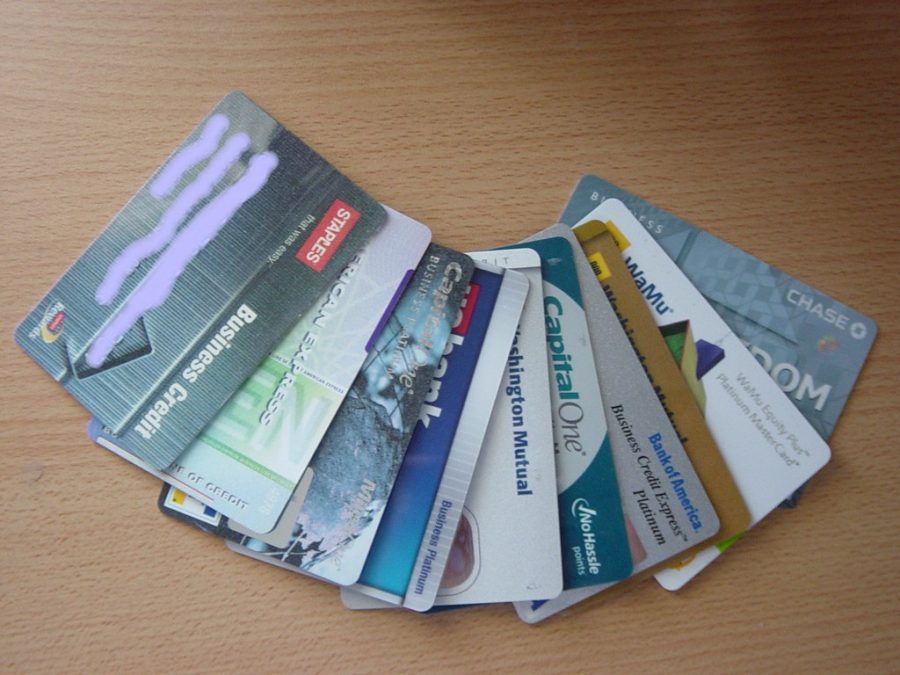Money transaction apps and credit cards are on the rise
More and more students are using credit cards, as opposed to cash, and this phenomenon could be detrimental if students are not properly educated about credit card usage.
October 23, 2019
In the past, when you go out to lunch with a friend and you need to pay them back, cash is the easiest option. However, with the rise of popularity of credit cards among teens, and the skyrocketing of money transaction apps such as Apple Pay and Venmo, it’s never been easier to pay someone back.
Digital monetary transactions have been taking over the WCHS community, with almost all transactions being done online. Club dues, shirt orders and even sports tickets are purchased through credit cards. The Online School Payments (OSP) system has made these card transactions easier, however not all students have access to cards.
“I wouldn’t have trusted myself when I was younger to have had a credit card,” senior Jackie Verba said. Verba has a job and keeps track of her money by herself. “I only use my card when I absolutely need to.”
According to Transunion, a credit agency, 20 percent of people 13 to 18 have a credit card. While this may seem low, the numbers are higher in the WCHS community.
According to a poll of 163 WCHS students, 98 of them have a credit card. Since almost all high school students are minors, and do not pay their credit card bills, these numbers are staggering.
Credit health, credit scores and overall financial wellbeing are topics that are not taught in the mandatory curriculum. Classes that cover these topics, such as AP Macro and Micro Economics, and Personal Finance are electives, so only a few students take them.
The drastic implications of having a credit card are something that few students learn, and the impacts of potential overuse of credit cards at a young age could lead to problems later in life if not properly educated on wise financial decisions.
According to a May 2019 article from TheBalance.com, poor credit scores can lead to being denied loans, high interest rates on credit cards and loans and difficulty purchasing big investments such as cars and apartments. Many WCHS students may not even be familiar with these terms.
“Not taking Personal Finance was one of my biggest regrets,” senior Danielle Miller said. “That class seems so helpful.”
Venmo, a money exchange app, has also risen in popularity. The app functions similar to a social media application, in that you can see the transactions of your “friends” throughout the site. While this can be turned off, it still can be a privacy invasion.
“I wouldn’t want anybody to see my money exchanges,” Verba said. “Who I give my money to is my own business.”
According to a 2017 study from MarketWatch.com, security breaches happen often in Venmo, owned by PayPal, as 207,984,218 public transactions were examined. For an app that many people trust to exchange large sums of money, Venmo has many flaws in its protections of the rights of his users.
“I’m not allowed to have Venmo,” Miller said. “People always ask me to Venmo them and it makes my life so much harder.”
However, Venmo can be one of the few ways to share money with someone. Senior Madison Cuthbert spearheaded the selling of the “Pink-Out” shirt for breast cancer awareness for the varsity football game against Bethesda Chevy-Chase High School, through Venmo and cash. If you don’t have cash on you, Venmo would be the only other option to purchase this shirt. These situations could be becoming more and more frequent.
The future is unknown for cash, and for coins as well. With so many opportunities to do digital transactions, using cash and coins can feel outdated.
According to a March 2019 thebalance.com article, Americans throw away 62 million dollars in cash every year. If all money were just digital, this problem would cease to exist.
This new wave of technology has created a new fad among today’s youth. “Credit Card Culture” has spread across WCHS, with cash becoming more and more obsolete.
“Why would I carry cash around when I could just Venmo people?” Verba said.


